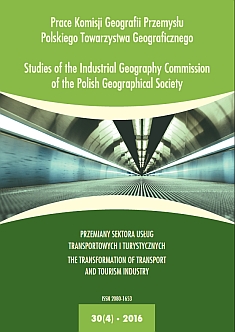Demand-related Conditions of the Development of Recreational Services in Krakow Based on the Example of University Students
DOI:
https://doi.org/10.24917/20801653.304.12Keywords:
free time, recreation function, recreation services, tourism, tourism activityAbstract
The growing importance of recreation as an economic phenomenon raises questions on its developmental mechanisms. At present, the market and demand-supply relations are the basic regulators of economic processes. Therefore, this paper is an attempt to determine the factors which are conditions for the size and structure of demand for recreation services among the university students in Krakow. The survey was administered among a total of 490 students of full-time and extramural undergraduate studies at the Pedagogical University in Krakow, the Pontifical University of John Paul II and the Agricultural University. One of the research hypotheses was the verification of the statement that the economic factor lies at the base of the possibilities to participate in recreation. Currently, young people have broad possibilities of active relaxation and recreation and it seems justified to state that only an economic factor may hinder participation in various forms of recreation. Research has shown that the main barriers that restrict student participation in various forms of recreation include the lack of free time (34% of all answers), followed by the financial condition (20.73%) and “lack of eagerness” (16.16%). Almost half of the respondents (46.6%) indicated that they use sports and recreational facilities in Krakow at least once a week while 5.9% do it every day, 24.5% - twice or three times a week, 16.2% once a week. The comparison of research results leads to the conclusion that students have their free time but they spend it on the Internet whereas active relaxation and recreation are of less importance to them.Downloads
Metrics
References
Alejziak, W. (2007). Inhibitory aktywności turystycznej. Teoretyczne i metodologiczne aspekty studiów nad ograniczeniami i barierami uczestnictwa w wyjazdach wypoczynkowych, Folia Turistica, 18, 59–87.
Bergier, J. (2012). Aktywność fizyczna społeczeństwa – współczesny problem (przegląd badań), Człowiek i Zdrowie, 6(1).
Czerepniak-Walczak, M. (2007). Od próżniaczenia do zniewolenia – w poszukiwaniu dyskursów czasu wolnego. W: E. Marynowicz-Hetka (red.). Pedagogika społeczna, t. II. Warszawa: PWN.
Delekta, A. (2013). Determinanty aktywności i destynacji turystycznych studentów dużego i małego ośrodka akademickiego. Kraków: Wydawnictwo Naukowe Uniwersytetu Pedagogicznego.
Delekta, A. (2014). Społeczne determinanty aktywności turystycznej studentów krakowskiego ośrodka akademickiego, Humanities and Social Sciences, 19(21), 25–35.
Godek, Ł., Brożyna, M., Śliż, M. (2014). Aktywność turystyczna studentów I roku turystyki i rekreacji w Wydziale Wychowania Fizycznego Uniwersytetu Rzeszowskiego. Turystyka i Rekreacja, 11(2), 82–86.
Gołembski, G., Hołderna-Mielcarek, B., Niezgoda, A., Szmatuła, P. (2002). Model zachowań turystycznych w czasie wolnym polskiej młodzieży studiującej. Problemy turystyki, 1–2, 69–85.
Kamińska, J. (2009). Model wypoczynku wakacyjnego studentów Kielecczyzny i jego determi- nanty. Handel Wewnętrzny, 11, 76–86.
Latosińska, J., Ludwicka, D. (2010). Aktywność turystyczna młodzieży akademickiej na przykładzie wyższych uczelni w Łodzi. Turyzm, 1, 21–28.
Lubowiecki-Vikuk, A.P., Paczyńska-Jędrycka, M. (2010). Współczesne tendencje w rozwoju form rekreacyjnych i turystycznych. Poznań: Bogucki Wydawnictwo Naukowe.
Lubowiecki-Vikuk, A.P., Podgórski, Z. (2013). Zachowania i preferencje turystyczne młodzieży akademickiej. W: R. Pawlusiński (red.). Współczesne uwarunkowania i problemy rozwoju turystyki. Kraków: Instytut Geografii i Gospodarki Przestrzennej Uniwersytetu Jagiellońskiego, 149–158.
Maksymiuk, G., (2005). Rozwój terenów rekreacyjnych – wspomaganie czy ograniczenie w przyrodniczej rewitalizacji miast. Teka Komisji Architektury, Urbanistyki i Studiów Krajobrazowych Oddziału Lubelskiego PAN, 1, 149–156.
Młodzi w internecie (2015, 12 grudnia). . Pozyskano z http://www.dziennikzachodni.pl/artykul/4509763,mlodzi-w-internecie-ponad-polowa-rodzicownie-wie-co-robia-tam-ich-dzieci,1,id,t,sa.html
Mróz, F., Rettinger, R. (2015). Turystyka aktywna a spędzanie czasu wolnego przez studentów kierunku „Turystyka i rekreacja” wybranych szkół wyższych w Małopolsce. W: A. Stasiak, J. Śledzińska, B. Włodarczyk B., (red.). Wczoraj, dziś i jutro turystyki aktywnej i specjalistycznej. Warszawa, 373–386.
Stangel, M., (2013). Kształtowanie współczesnych obszarów miejskich w kontekście zrównoważonego rozwoju. Gliwice: Wydawnictwo Politechniki Śląskiej.
Ujma-Wąsowicz, K. (2007). Otwarte tereny aktywnej rekreacji na obszarach zurbanizowanych. Cele i kierunki rozwoju. Czasopismo Techniczne. Architektura, 104(1A), 169–174.
Young Europeans: A survey among Young people aged between 15 and 30 in the European UnionAnalitycal Report (2007) (2016, 21 stycznia). Flash Eurobarometr, 202. Pozyskano z http:// ec.europa.eu/public_opinion/flash/fl_202_en.pdf
Zaniewska, K. (2012). Kultura czasu wolnego młodzieży akademickiej średniego miasta. Colloquium Wydziału Nauk Humanistycznych i Społecznych, 3, 123–144.
Zielińska, M. (2011). Teoretyczne i metodologiczne problemy badania czasu wolnego – co, jak i po co badać. W: E. Narkiewicz-Niedbalec, M. Zielińska (red.). Młodzież w czasie wolnym. Między przyjemnością a obowiązkami. Toruń: Wydawnictwo Adam Marszałek, 5–6.
Downloads
Published
How to Cite
Issue
Section
License
Articles are published under the terms of the Creative Commons License (CC BY-ND 4.0; Attribution– NoDerivs).

